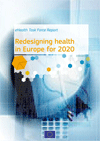
In 2020 the health and health care of our citizens could look quite different. We find ourselves today on the threshold of a new era with many opportunities for radical improvements in the way we manage and receive health care. In order to ensure the sustainability of our health care systems, there is a need to tackle considerable challenges. This report focuses on how to achieve a vision of affordable, less intrusive and more personalised care. Ultimately, increasing the quality of life as well as lowering mortality. Such a vision depends on the application of ICT and the use of data. The Task Force behind this report was convened to explore the potential of ICT in health innovation in the EU and make recommendations on what could be done now to ensure that Europe reaps the full benefits of eHealth in 2020.
Today, healthcare costs in Europe are climbing. Healthcare is a constantly growing component of public finances, rising to 9 % of GDP and representing between 6% and 15% of government spending in most EU countries. These costs are driven by demographic changes, a dramatic increase in chronic conditions linked to unhealthy lifestyles, expensive new technologies and products, the need for more specialised skills and the demand for high level care.
Download Redesigning Health in Europe for 2020 (.pdf, 9.293 KB).
Download from eHealthNews.eu Portal's mirror: Redesigning Health in Europe for 2020 (.pdf, 9.293 KB).